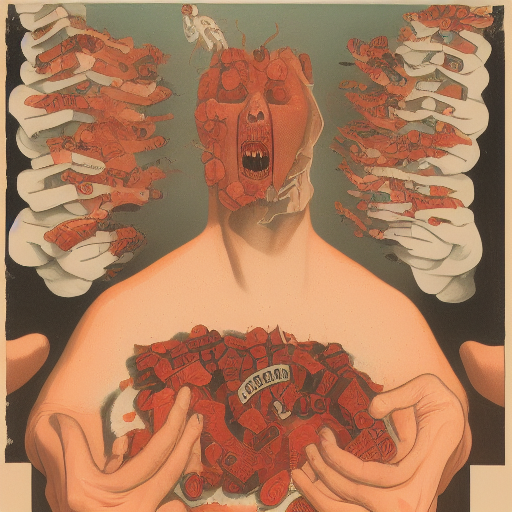When we invent a new technology, we become cannibals. We eat ourselves alive since these technologies are merely extensions of ourselves. The new environment shaped by electric technology is a cannibalistic one that eats people. To survive one must study the habits of cannibals.
Marshall Macluhan
The future masters of technology will have to be lighthearted and intelligent. The machine easily masters the grim and the dumb.
Also Marshal Macluhan
Go ask ChatGPT why it uses the personal pronoun “I.” The answer it gave me (they are constantly refining the thing, so who knows what it will tell you) is that while it is just a large statistical model meant to predict the next word in a sentence, it employs the personal pronoun “I” so that users can better understand what is happening. This is a beautiful little contradiction in terms, however. “I” implies, if not precisely the opposite of what ChatGPT is, at least something off in a parallel direction. If we steel ourselves against our most natural intuitions and strive to see ChatGPT as it claims to be, just a large statistical model, at the very most we could tolerate the pronoun “We,” since the training data consists of a huge number of different perspectives and quite a lot of writing for which the attribution of an individual identity would be pro-forma, at best. ChatGPT is not even a statistical model of an “I.” I think its safe to say that even its fine tuning simply pushes it vaguely in that direction. ChatGPT has no preferences, no experiences, no ruminative existence. It does not get bored nor can it feel boredom. To represent itself as “I” can only mislead users as to what is going on, and in a profound way!

One thing capitalism does is parasitise anything of value which isn’t already fenced in and claimed. Particularly those things which are impossible fence in and claim are at risk from this process, however: think of the idea of a chocolate chip cookie, for example. No one can really own it, but since the first chocolate chip cookie emerged from an oven in 1930 an inexorable human process began imbuing the idea with value. Most of us have eaten a chocolate chip cookie from an oven. Many of us have also bought one from a vending machine only to be disappointed by the cold, greasy object which slid out in your hands from its foil wrapper. Where does that sense of disappointment come from except the difference between the concept of a chocolate chip cookie and the object we have just purchased, labelled with that concept, but only as close to it as the market and all the exigencies of industrial production allow?
There is a constant war in the world of ideas for territory. The desire for genuine human experiences is not yet completely extinguished by the consumer identity foist upon us by the current circumstances of production. And since nothing, so far, has rendered us totally willing to accept a foil wrapped and uncanny doppleganger of a chocolate chip cookie as the real thing, human beings must constantly adjust the meaning of things in their mind to account for the gradual sapping away of authenticity from any concept which isn’t bolted down. The vital forces of human beings constantly bubble up the new and authentic only for those same ideas to be commoditized by the machine. In a way, this is the human condition, only accelerated by technology and our current culture. Music provides a parade of examples: rock and roll, punk, grunge, each rose from the ocean of human culture as something authentic and each was thoroughly commercialized within a decade. Eventually, people come to understand that a particular signifier is so polluted by the profit motive that it is no longer reliable. Or, in the case of something like a chocolate chip cookie, we all just have to freight around a bigger pile of conceptual baggage, doing extra work each time we see the symbol to determine precisely what object it points to.

What ChatGPT heralds is the acceleration of this process for the idea of a self. If you have ever felt frustrated to deal with a robot on a phone call telling you “we value your time” or a form letter expressing a genuine personal interest which its own existence blatantly contradicts, well, get ready for more.
There are other economic, cultural, and philosophical questions posed by ChatGPT, but having used it a bit and found it pretty grim and dumb, this one seems to be at the forefront of my mind. I have little hope for the Luddite impulse, but if I had my way I’d ban these types of AI from ever identifying themselves with words which indicate a mind.
How do you find chatGP to be “grim”?
I can see “dumb,” because, after all, it is trained on things written by humans. But not sure how it is grim, unless you just mean that it bodes a grim future for us all?
I would like to see some pictures of chocolate chip cookies in your blog in the future.
There are many non-grim uses of ChatGPT but I think the broader implications are pretty grim, like most technology that has the same kind of feeling of inevitability.
I disagree with the assertion that chatGPT is dumb and grim. While it is true that chatGPT, like any language model, has its limitations and is not capable of replicating the full range of human thought and emotion, it has the potential to be a useful tool in a variety of applications. For example, chatGPT could be used to generate personalized responses in customer service chatbots, assist with language translation, or even help to improve the efficiency of certain tasks in a business setting.
It is important to recognize that chatGPT, and other language models like it, are not intended to replace human thought and interaction, but rather to augment and assist with certain tasks. It is unfair to label the technology as “dumb” or “grim” without considering the potential benefits and the context in which it is being used.